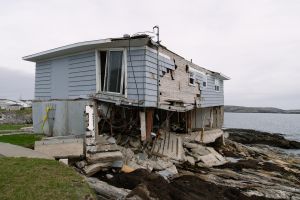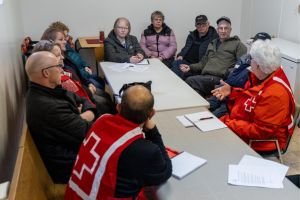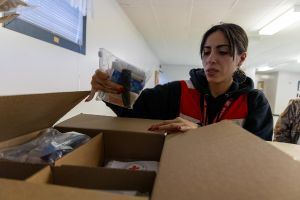The impact of Hurricane Fiona in Newfoundland and Labrador
In Newfoundland and Labrador, residents of coastal communities prepared for Hurricane Fiona like any other storm.
In communities where storms and wind gusts of 100km/h and above are common, community members did not foresee the impact Hurricane Fiona would have for years to come.
In Channel-Port-aux-Basques and surrounding communities, wind gusts were recorded at 179km/h, wave heights of 17 metres, and a peak wave of 30 metres. The hurricane caused unprecedented damage, impacting more than 85 households.

In the aftermath of Hurricane Fiona, communities relied on partnerships, volunteers, and community members to come together to clean up, rebuild, and support affected communities and residents.
Emergency preparedness in rural coastal communities – before, during, and after an emergency
In February 2024, a team of four Canadian Red Cross experts visited Rose-Blanche and Burnt Islands as part of a new emergency preparedness program that is being piloted in several coastal communities in Newfoundland.
During the visit, the team of experts consulted with members of the communities and other key partners in constructive knowledge sharing, conversations about the stages of emergency preparedness and response, and next steps for the pilot project.

“It was very touching to hear how the communities were impacted by Hurricane Fiona,” says Andréa Parent, Social Media and Digital Content Coordinator. “Some people confided that they had lost their homes and had to build a new home for themselves in the aftermath of the hurricane.”

The program's intent is to collaborate with rural communities to improve emergency preparedness, understand the community's needs, and identify ways to respond to future emergencies.
Empowering resilient communities for future disasters
The team visited two potential shelter sites located in Rose-Blanche and Burnt Islands to discuss what updates were needed to make the sites a practical shelter in case of a future emergency.
Canadian Red Cross community action kits, which include cots, blankets, and hygiene supplies were distributed to communities prior to the teams visit. The team discussed how to use and store the equipment, along with expiration dates and best practices.

“You could feel how tight knit the community members were. I felt like there was a real desire from both communities to be better prepared for the eventuality of another disaster. While we all hope no other disaster will happen, it is always better to be prepared.” – Andréa Parent.
The pilot program is a learning opportunity for both the Canadian Red Cross and local communities. The Canadian Red Cross will continue collaborating with communities in this ongoing partnership.

